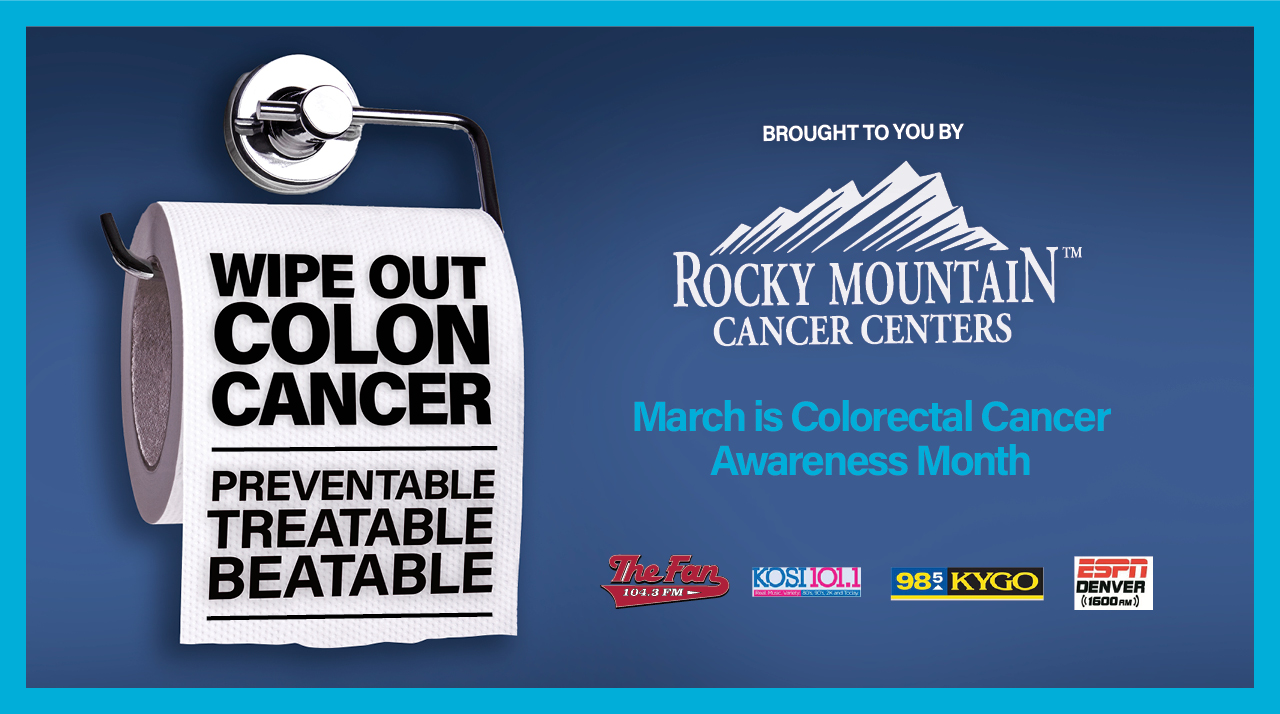Colon Cancer Awareness Month

Wipe Out Colon Cancer
As Colorado’s largest community-based cancer care network, Rocky Mountain Cancer Centers is working to educate the community on the importance of colorectal cancer screening, early detection, and prevention. According to the American Cancer Society, excluding skin cancers, colorectal cancer is the third most common cancer diagnosed in both men and women in the United States. We are working to promote the importance of early detection and the difference it can make in survivorship.
Preventable, Treatable, Beatable
Screenings save lives. Family history, ethnicity, and race can put you at a higher risk for colorectal cancer so it is important to talk with your doctor regarding screening recommendations.
A colonoscopy is considered the “reference standard” screening study for colon polyps and cancer. During a colonoscopy, a gastroenterologist looks at the inner lining of the colon (large intestine) for any polyps- small clumps of cells that have formed on the lining- and then will remove them. Most colon polyps are harmless but over time some can develop into cancer. If they are cancerous finding them earlier when the disease is easier to treat is important. If caught early it is highly curable. Yet only about a third of cases are diagnosed in early, highly curable stages of the disease.
Know the Signs and Symptoms
Talk to your doctor if you are experiencing any of the following:
- Rectal bleeding or blood in your stool
- Persistent abdominal discomfort (cramps, gas, pain, or feeling bloated)
- Unexplained weight loss
- Chronic fatigue
- Nausea or vomiting
Get Screened
The American Cancer Society’s 2021 guideline recommends colorectal cancer screening starting at the age of 45 for those at average risk. If you are at high risk for the disease, talk with your doctor about the recommended age for you to start screening.
Regardless of your age or family history, if you are experiencing symptoms don’t ignore them. Young-onset colorectal cancer has increased by 51% since 1994. The Colorectal Cancer Alliance reports that 151,030 people will be diagnosed with colorectal cancer this year. Don’t wait – talk to your doctor about screening.
Know Your Family Health History
People with a high risk of colorectal cancer might need to start screening before age 45, be screened more often, and/or get genetic testing. This includes people with:
- A strong family history or personal history of colorectal cancer or certain types of polyps
- A personal history of inflammatory bowel disease
- A known family history of a hereditary colorectal cancer syndrome such as familial adenomatous polyposis (FAP) or Lynch syndrome
- A personal history of radiation to the abdomen or pelvic area to treat a prior cancer
Learn more about genetic testing at rockymountaincancercenters.com/genetic-counseling-and-testing/.
Your Family Has a History or Colon Cancer – Now What?
At RMCC, our Colon Cancer Prevention and Risk Assessment Clinic is designed to help patients accurately evaluate their colon cancer risk based on their personal history, family history, and genetic testing.
Our unique program includes a collaborative approach to surveillance and risk reduction involving both a board-certified medical oncologist and a certified genetic counselor.
The program includes:
- Review of screening colonoscopies
- Review of personal and family history
- Genetic counseling and testing for hereditary cancer conditions such as Lynch Syndrome
- Sample is collected at the end of the genetic counseling appointment (ex. blood draw)
- Results are completed in approximately one month
- Results are disclosed at a follow-up appointment
- Patients receive a personalized medical management plan based on their risk assessment
Clinical Research Trials
At RMCC, our oncologists are well-versed in the latest advancements in colon cancer research, genetics, risk assessments, and new targeted therapies and immunotherapies. Clinical research trials represent some of the most advanced treatment options. Talk to an oncologist for more information about colon cancer research trials at RMCC.